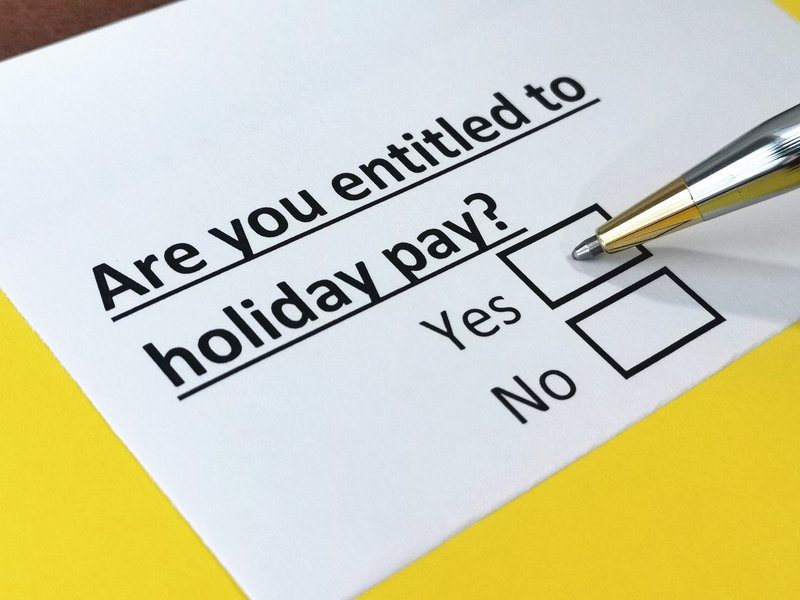As an employer, you are required by law to give your employees a certain number of days of holiday during the year. The amount of annual leave employees are entitled to depends on several factors.
This guide to leave entitlement for small business owners explains the amount of holiday you are required by UK law to give your employees, and how to calculate this for workers not working a normal working week.
Also covered are the laws regarding bank holidays, carrying over unused leave days, imposing a period of annual leave on staff e.g. over the festive season, and when you can refuse employees’ requests to take holiday;
Annual leave entitlement for UK employees
The law which sets the UK annual leave entitlement is the Working Time Regulations 1998.
Currently, workers are entitled to a minimum of 5.6 working weeks paid annual leave per year, which equates to 28 days’ holiday per year for someone who works 5 days per week. The first 4 weeks are granted through the EU Working Time Directive and may have additional rules attached to them.
A ‘week’ of annual leave is the same length as an employee’s normal working week: so if they work 3 days a week, then their overall entitlement will be 3 x 5.6 or 16.8 days.
The maximum statutory entitlement is capped at 28 days, meaning that anyone working 6 days a week will only be entitled to the same 28 days as someone working a 5 day week.
It is important to check for any contractual entitlement as well, as some companies may allow an enhanced annual leave entitlement or may allow long serving employees gain additional days depending on their length of service.
You must pay staff holiday pay while they are on annual leave. The rules on calculating how much holiday pay an employer must pay employees can be complicated so are explained in our separate, dedicated Guide to calculating holiday pay.
Bank holidays and annual leave entitlement
Bank holidays can be included in the 5.6 weeks entitlement. It is the employer’s choice whether to let employees have bank holidays off on top of their annual leave, or whether to let them have bank holidays off at all.
It is not a statutory requirement to get the day of the bank holiday off but where a bank holiday is worked, employers must ensure that the worker still gets 5.6 weeks of annual leave off during the leave year.
Carrying holidays over
An employee accrues holidays over the course of a leave year and usually must take them within the leave year in which they were acquired. It is the employer who sets when a leave year starts and ends and this could be, for example, a calendar or a financial year.
If the employee does not take all their holidays, they may lose them unless the employer agrees some to be carried over. However, the entire year’s worth of leave entitlement cannot be carried over, as the 4 weeks granted by the EU law has to be taken in the leave year in which it is accrued.
Free Tide Business Bank Account - £50 Cashback!

Open a free business current account to qualify + enjoy 12 months free transactions. Read our Tide review.
However, the remaining 1.6 week entitlement can be transferred to the next leave year, subject to an agreement. This equates to 8 days for a 28 days’ entitlement.
Annual leave accrued while on sick or family-friendly leave
If an employee is on sick leave or another type of statutory leave, such as maternity leave, which makes them unable to take their holiday entitlement in the relevant leave year, they must be allowed to carry some of it over to the next year.
With sick leave, however, the employer need only allow them to carry 4 weeks over. With maternity leave, the employer should allow the employee to carry over the whole amount.
Case law has clarified that if an employee does not take their annual leave during their sick leave, they are still entitled to take it for up to 18 months from the end of the leave year in which it was accrued. After this point, it is lost.
When staff are sick when on annual leave
If an employee is sick while on annual leave, there is nothing in theory to prevent them from taking their holiday entitlement when they are sick.
Employees do not have a legal right to cancel their holiday request in order to take sick leave. However, if your employee was genuinely sick and they have complied with your notification and evidence requirements, then you may treat the time away as sick leave. This is because if they have been ill they may not have had the break from work they may have needed.
RELATED: Managing staff sickness absence – A Guide for small businesses
Refusing a request for annual leave
Rules for requesting annual leave are at an employer’s discretion and should be included in their annual leave policy. The policy can set out the procedure of making a request; notification requirements and even set maximum caps on the number of staff who can be off at the same time.
For instance, if as a small business, you may only be able to accommodate 1 or 2 people being off on annual leave at the same time, then employers can include this in their rules. If you get holiday requests which would mean this cap is exceeded, you can reject them for that reason.
Even if you do not have this policy, you are still able refuse requests if you cannot accommodate them. To do this, you will need to give the employee counter-notice in writing that they cannot take annual leave on that particular day.
In order for the counter-notice to be enforceable, you need to give them at least as many days’ notice as the length of leave requested. For example, a request for one week’s leave would require a week’s notice to the employee that their request has been refused.
When you are refusing an annual leave request, you must be certain that you have done so fairly and that you haven’t discriminate against the employee.
For example, if a member of staff wants to take time off during a busy period to attend a religious festival, because of the circumstances of the request, you may decide to grant it, where you would usually refuse such a request if it was made purely for leisure purposes.
Imposing a period of holiday on your employees
Some companies may have a period of annual shutdown, for example over Christmas or during rainy months if the company’s work is dependent on weather conditions.
For that reason, some employers may wish to enforce a period of holiday and they can do so as long as they give at least twice as much notice as the length of the leave. For example, a period of one week’s imposed holiday would require a 2 weeks’ notice.
You may also impose a period of holiday at different times for different employees to ensure that annual leave is spread out and there are enough people to cover any busy periods.
When an employee reaches the end of a contract
When a contract of employment ends, employees may not have taken all of the holidays which they have accrued in that leave year. Annual leave entitlement cannot be substituted by payment in lieu; the only exception to this is where the employee’s contract comes to an end.
If an employee does not receive pay for any accrued but untaken but holidays, they can make a claim for unlawful deductions from wages. When working out the payment, remember that if the employee is working their notice, annual leave continues to accrue during this period.
If an employee leaves you in the middle of a leave year having taken more holiday than they have accrued at the time of their termination, then you may deduct this from their final salary provided the contract of employment contains an express clause giving you that right. Otherwise, you may be liable for an unauthorised deduction from wages.
This guide has been written exclusively for ByteStart by Peter Done, Managing Director of Peninsula Business Services – the UK’s leading specialist Employment Law, HR and Health & Safety service.










